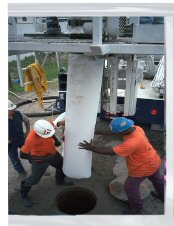
The ECO series resins, designed for cured-in-place pipe (CIPP) applications, allow for the repairing of partially or fully deteriorated underground pipes. They meet the requirements of the ASTM F1216 standard (Standard Practice for Rehabilitation of Existing Pipelines and Conduits by the Inversion and Curing of a Resin-Impregnated Tube).
US speciality chemicals company Interplastic says the resins are ideal for gravity pipelines, providing consistent quality, fast wet-out, trouble-free processing, high strength and excellent flexural modulus.
The ECO series comprises:
- CORVE8290, a styrene-free vinyl ester resin;
- CORVE8295, a styrene-free, modulus enhanced vinyl ester; and
- CORVE8287, a styrene-free, ambient cure vinyl ester resin for laterals and point repairs.
Interplastic claims the resins reduce the likelihood of stress cracking and shrinkage, with a lower exotherm in the enhanced version.

